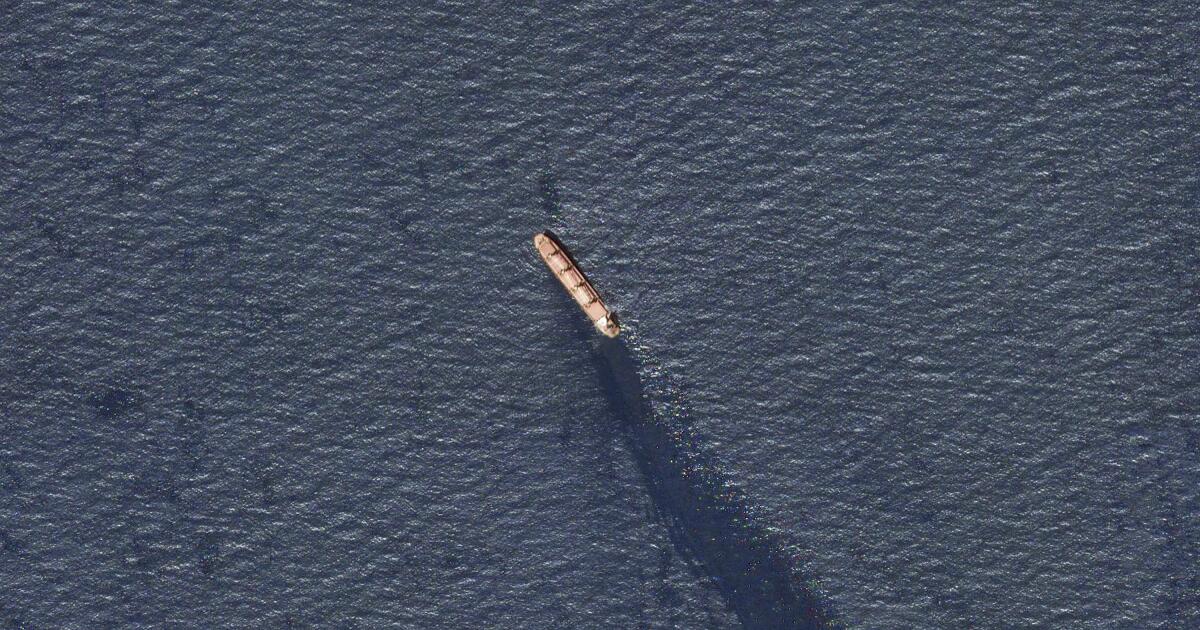Oil spill, fertilizer leak from sunk cargo ship highlight risks to Red Sea from Houthi attacks

A vibrant fishing industry, some of the world’s largest coral reefs, desalination plants supplying millions with drinking water. They’re all at risk from large amounts of fertilizer and oil spilled into the Red Sea by the sinking of a cargo ship attacked by Yemen’s Houthi rebels.
Officials on Saturday said the M/V Rubymar, a Belize-flagged vessel reportedly carrying 22,000 metric tons of toxic fertilizer, sunk after taking on water in the Feb. 18 attack.
Even before plunging to the ocean’s depths, the vessel had been leaking heavy fuel that triggered an 18-mile oil slick through the waterway, which is critical for cargo and energy shipments heading to Europe.
Since November, the Houthi rebels have repeatedly targeted ships in the Red Sea over Israel’s war in Gaza. They have frequently targeted vessels with tenuous or no clear links to Israel.
U.S. Central Command, which oversees the Middle East, has warned in recent days of an “environmental disaster” in the making. That has less to do with the size of the vessel’s hazardous cargo than the unique natural features and usage of the Red Sea, said Ian Ralby, founder of maritime security firm I.R. Consilium.
Aggravating concerns over the Rubymar’s sinking is the Red Sea’s unique circular water patterns, which operate essentially as a giant lagoon, with water moving northward, toward the Suez Canal in Egypt, during winter and outward to the Gulf of Aden in summer.
“What spills in the Red Sea, stays in the Red Sea,” said Ralby. “There are many ways it can be harmed.”
Saudi Arabia for decades has been building the world’s largest network of desalination plants, with entire cities like Jeddah relying on the facilities for almost all of their drinking water. Oil can clog intake systems and inflict costly damage on saltwater conversion.
The Red Sea is also a vital source of seafood, especially in Yemen, where fishing was the second largest export after oil before the current civil war between the Houthis and Yemen’s Sunni government.
Ralby has been studying the Red Sea’s vulnerabilities in relation to what could’ve been a far worse maritime tragedy: the FSO Safer, a decrepit oil tanker that had been moored for years off the coast of Yemen with more than 1 million barrels of crude until its cargo was successfully transferred to another vessel last year.
While the amount of oil the Rubymar leaked is unknown, Ralby estimates it couldn’t have exceeded 7,000 barrels. Although that’s a mere fraction of the Safer’s load, it’s significantly more oil than was spilled by a Japanese-owned vessel, the Wakashio, that wrecked near Mauritius in 2020, causing millions of dollars in damages and harming the livelihood of thousands of fishermen.
Harder to grasp is the risk from the 22,000 metric tons of fertilizer that port authorities in Djibouti, adjacent to where the Rubymar sank, said the ship was transporting at the time of the attack. If the Rubymar remains intact underwater, the impact will be a slow trickle instead of a massive release, said Ralby.
Fertilizer fuels the proliferation of algae blooms like the ones seen every year in the Texas Gulf Coast as a result of far larger nutrient runoff from farms, urban lawns and industrial waste. The result is the loss of oxygen, asphyxiation of marine life and the creation of so-called “dead zones.”
At risk in the Red Sea are some of the world’s most colorful and extensive coral reefs. Several are major tourist draws and increasingly a subject of great scientific research owing to their apparent resilience to warming seawater temperatures that have destroyed reefs elsewhere in the ocean.
However manageable the fallout from the Rubymar’s sinking, Ralby worries that it could be a forerunner of even worse to come. He said most of the container ships pulled out from the Red Sea shipping lanes since the Houthis began targeting ships in the area over the Israel-Hamas war. What remains, he said, are poorly maintained vessels, oil tankers and bulk carriers that pose far greater environmental risks.
“With fewer and fewer container ships to target, the odds of another spill with massive environmental impact has increased enormously,” said Ralby.
Joshua Goodman is a reporter with the Associated Press.
Share this news on your Fb,Twitter and Whatsapp
Times News Network:Latest News Headlines
Times News Network||Health||New York||USA News||Technology||World News